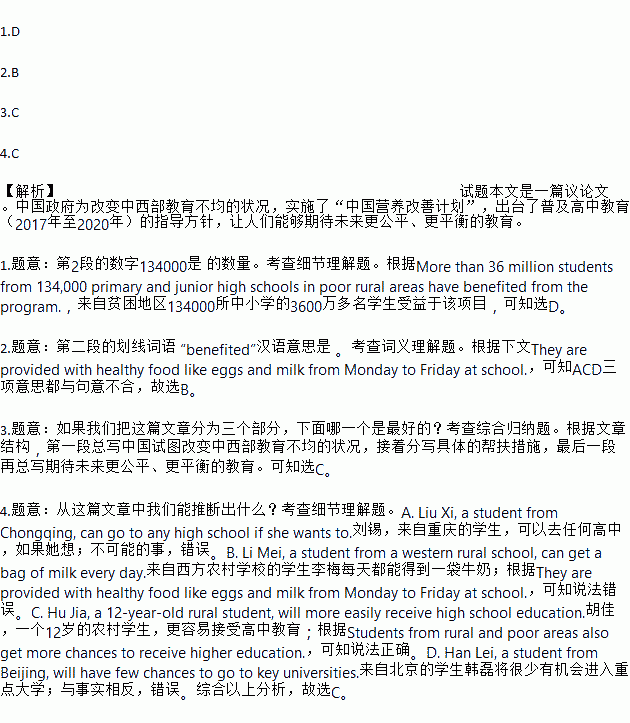题目内容
Could the students from less developed areas in central and western China get the same educational chances as those in big cities in the east Could the children in poor rural (农村) areas develop as well as those in rich cities Maybe the answers were “No” in the past. But now, China is trying to change the situation.
In order to help rural students grow taller and stronger. China’s Nutrition(营养)Improvement Program started in 2011. According to the program, a lot more money was spent improving students’ meals. More than 36 million students from 134,000 primary and junior high schools in poor rural areas have benefited from the program. They are provided with healthy food like eggs and milk from Monday to Friday at school. And the result of a survey shows that the students in those areas are much taller and stronger than before.
It is true that there were differences between less developed areas and developed areas in education before. Recently, The Guideline for Popularizing High School Education(2017-2020) has come out. According to the guideline, above 90%students from all over the country will go to high schools by 2020. What’s more, the schools in central and western areas will get more support to improve their education.
Students from rural and poor areas also get more chances to receive higher education. A special college program makes it possible for more students from those areas to go to key (重点的) colleges and universities. The number will be increased by 10%in 2017.
With the guideline and the programs, we can expect a fairer and more balanced(均衡的) education in the future.
1.The number 134,000 in Paragraph 2 is the number of in poor rural areas.
A. the key high schools
B. the poor students
C. the key colleges and universities
D. the primary and junior high schools
2.The underlined word “benefited” in Paragraph 2 means in Chinese.
A. 逃离 B. 获益 C. 受害 D. 赚钱
3.If we put the passage into three parts, which of the following is the best?
(①=Para.(自然段)1②=Para.2③=Para.3④=Para.4⑤=Para.5)
A. ①②;③④;⑤ B. ①;②③;④⑤
C. ①;②③④;⑤ D. ①②;③;④⑤
4.What can we infer(推断) from this passage?
A. Liu Xi, a student from Chongqing, can go to any high school if she wants to.
B. Li Mei, a student from a western rural school, can get a bag of milk every day.
C. Hu Jia, a 12-year-old rural student, will more easily receive high school education.
D. Han Lei, a student from Beijing, will have few chances to go to key universities.















